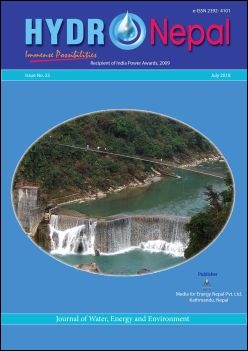An Assessment of Resource Recovery Potential and Management of Municipal Solid Waste in Jeetpur Simara Sub-Metropolitan City, Nepal
DOI:
https://doi.org/10.3126/hn.v23i0.20831Keywords:
Jeetpur Simara, Resource recovery potential, Organic waste composting, Municipal solid waste management, Landfill, NepalAbstract
Globally, rapid population growth, unmanaged urbanization, and increased income level have brought significant changes in quantity and composition of solid waste generation. In developing countries, solid waste disposal in open dump sites is widely practised as an easy and economical method of waste disposal. The increased quantity and composition of solid waste has posed a serious threat to public health and environment in developing countries. Hence, alternative waste disposal methods such as composting, recycling etc. can be potential options for sustainable solid waste management. Such methods will also reduce the waste volume prior to reaching the landfill and will increase the landfill’s life. This paper aims to calculate the recovery value from Municipal Solid Waste (i.e. composting, biogas, paper, and plastic) in Jeetpur Simara Sub-Metropolitan City (JSSMC) in Nepal, and to calculate the area required for landfilling and dumping of biodegradable and residual solid waste respectively. Due to high biodegradable content (8,400 kg/day), the recovery values from compost and biogas generation are studied. Optimum distribution of biodegradable solid waste among these two options is also evaluated. A combination of 6.4 tons/day for composting and 2 tons/day for landfilling with a net recovery of NRs. 29,064 per day is calculated. The recovery values from plastic and paper are calculated at NRs. 11,088 and NRs. 15,048 respectively. Hence, a total recovery value of NRs. 201.48 lakhs per year is suggested. This revenue is excluding the construction and operation cost required for the establishment of compost plant and landfill biogas collection system. The area required to landfill 2 tons/day of degradable waste is 0.876 hectares and 4.06 hectares to dump residual solid waste for a design period of 15 years. In case, biogas is not extracted, a total of 4.936 hectares’ land is required for dumping the entire MSW generated from JSSMC. The revenue calculated reduces to NRs. 47,640 per day or NRs. 173.88 lakhs per year.
HYDRO Nepal Journal
Journal of Water, Energy and Environment
Issue: 23
Year: 2018
Downloads
2829
1045
Downloads
Published
How to Cite
Issue
Section
License
The copyright of the articles and papers published is held by HYDRO Nepal Journal.
The views and interpretation in this journal are those of author(s), and HYDRO Nepal does not bear any responsibility for the views expressed by authors in the journal.




